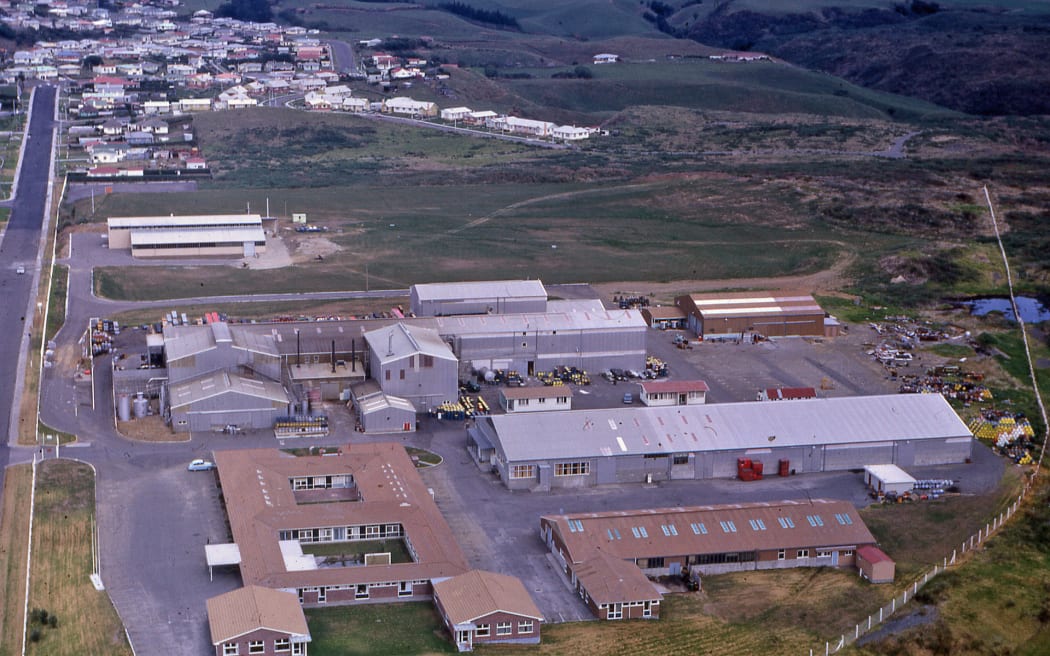
The Paritutu agrochemical plant in 1968. Photo: CC / Phillip Capper
There needs to be independent oversight of multi-national agrichemical company Corteva's promised testing of its controversial Paritutu site in New Plymouth, mayor Neil Holdom says.
From the 1960s through to 1987, Ivon Watkins (later Ivon Watkins-Dow) made the herbicide 2,4, 5-T, at Paritutu - which contained the toxic dioxin TCDD.
The herbicide was a key component of Agent Orange - the defoliant used by the United States military in the Vietnam War - and has been linked to cancers and birth defects.
In the mid '80s elevated levels of TCDD were found in the soil on the site's boundaries with reserve land and a residential street.
In 1998, similar levels were found on Mt Moturoa some distance away.
Corteva Agriscience, previously the agricultural arm of DowDuPont, is demolishing the site and - following lobbying from the New Plymouth District Council (NPDC) and Taranaki iwi - has announced it will thoroughly test the 16 hectare site and publicly release its results and plans for any clean up.
Holdom wants independent oversight of that testing.
"I would be thinking about some science oversight from the likes of the Taranaki Regional Council and the likes of the Ministry for the Environment and potentially Taranaki iwi.
"So, overseeing the testing and overseeing the preparation of the results to just ensure that objectivity."
Holdom feared a "cocktail of chemicals" would be found at Paritutu.
"Listening to someone who worked at the site, it's clear that there were more than 200 carcinogenic chemicals that were ingredients for the products produced there and that the approaches back in the day to dealing with them were not very environmentally sound.
"So, there will be a cocktail of chemicals under the ground there and it's just how bad they are, how much there is and how widely spread it is?
"We know there is dioxin in there and 2, 4, 5-T ... we don't know the list of what will be under the ground there, but there will be a lot."
In its response to emails from the NPDC and Taranaki iwi asking for more clarity about testing and its plan for the site, Corteva Agriscience managing director for New Zealand, Rob Kaan, said the company would hold a public information session on 21 November to share its and Dow's testing plan.
That plan would have "specific focus on areas with a higher likelihood of contamination and will be based on information obtained from drawings, photos, historical reports, interviews with former employees and input from stakeholders including regulators".
Kaan said as had been the case for routine testing over the past 20 years, Dow would share its results with the Taranaki Regional Council.
"Once sampling and testing are conducted a plan for clean up of any areas found to be contaminated can be developed in line with regulatory requirements."
To outline Corteva's ongoing commitment to the Paritutu site, Kaan shared Dow's separation agreement with Du Pont - now a part of Corteva - with the NPDC and Taranaki iwi.
"We appreciate that the agreement is quite lengthy and complex as it intended to cover many more topics than the allocation of liabilities; nonetheless, we share it for your information and in response to your request.
"As we have shared before, Corteva remains committed to meeting its safety and environmental obligations concerning the New Plymouth site and its surrounding communities."
Kaan said current testing being conducted by qualified environmental consultants on behalf of Dow at the site continued to be shared with the Taranaki Regional Council and were available to the public.
"These show that there is no hazardous level of contamination in the groundwater passing underneath the site. Surface water testing also shows no contamination in surface or storm water from the site, and there are no emissions to air from the site."
Holdom said if the site could be made safe he would like to see it gifted to the city and turned into a reserve.
"If could gaze in my crystal ball and get the ultimate outcome, the site is cleaned up extremely well and then gifted back to the community and if we could [get] scientific advice that allowed us to ensure its safety we could plant it out and let it regenerate and let nature get back in there and have it as a public space.
"But we can't have people in there if it's not safe. You can't put playgrounds in there or public gardens or things like that because of the risk of dioxins and things like that."
Holdom was also realistic about what Corteva's plans for the site might be if it was proven safe.
"I'm pragmatic, my view is that if Corteva clean the site up really well that will add value to it and they'll probably look to just put it on the market and someone will purchase it and develop it."


